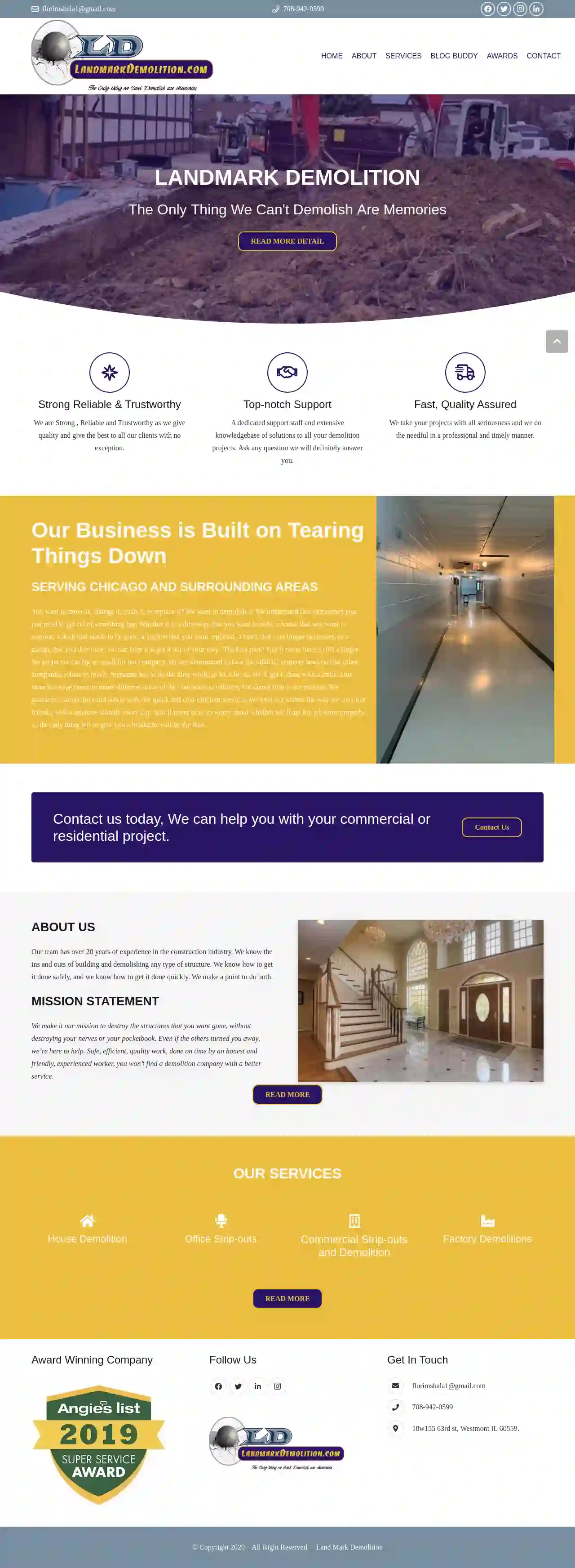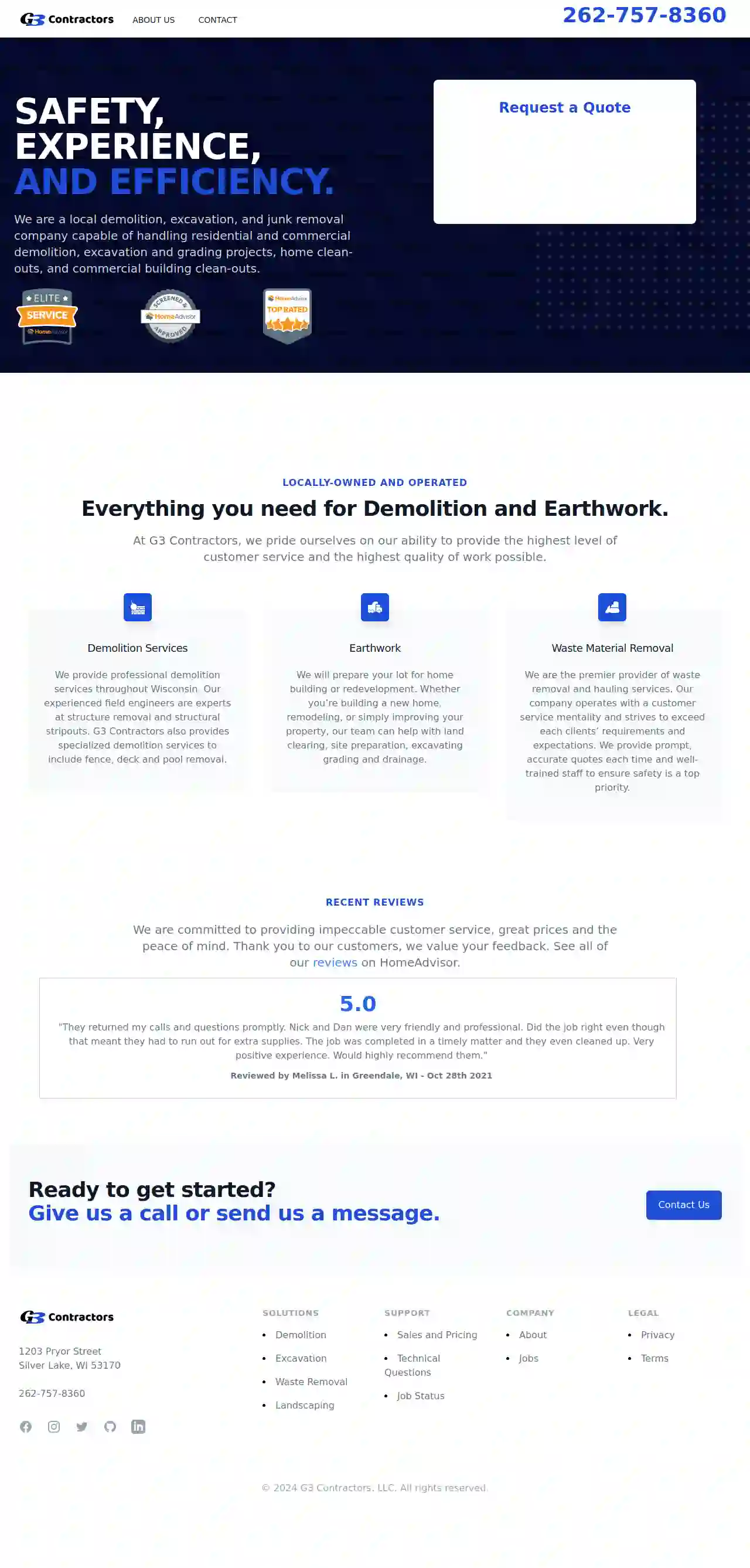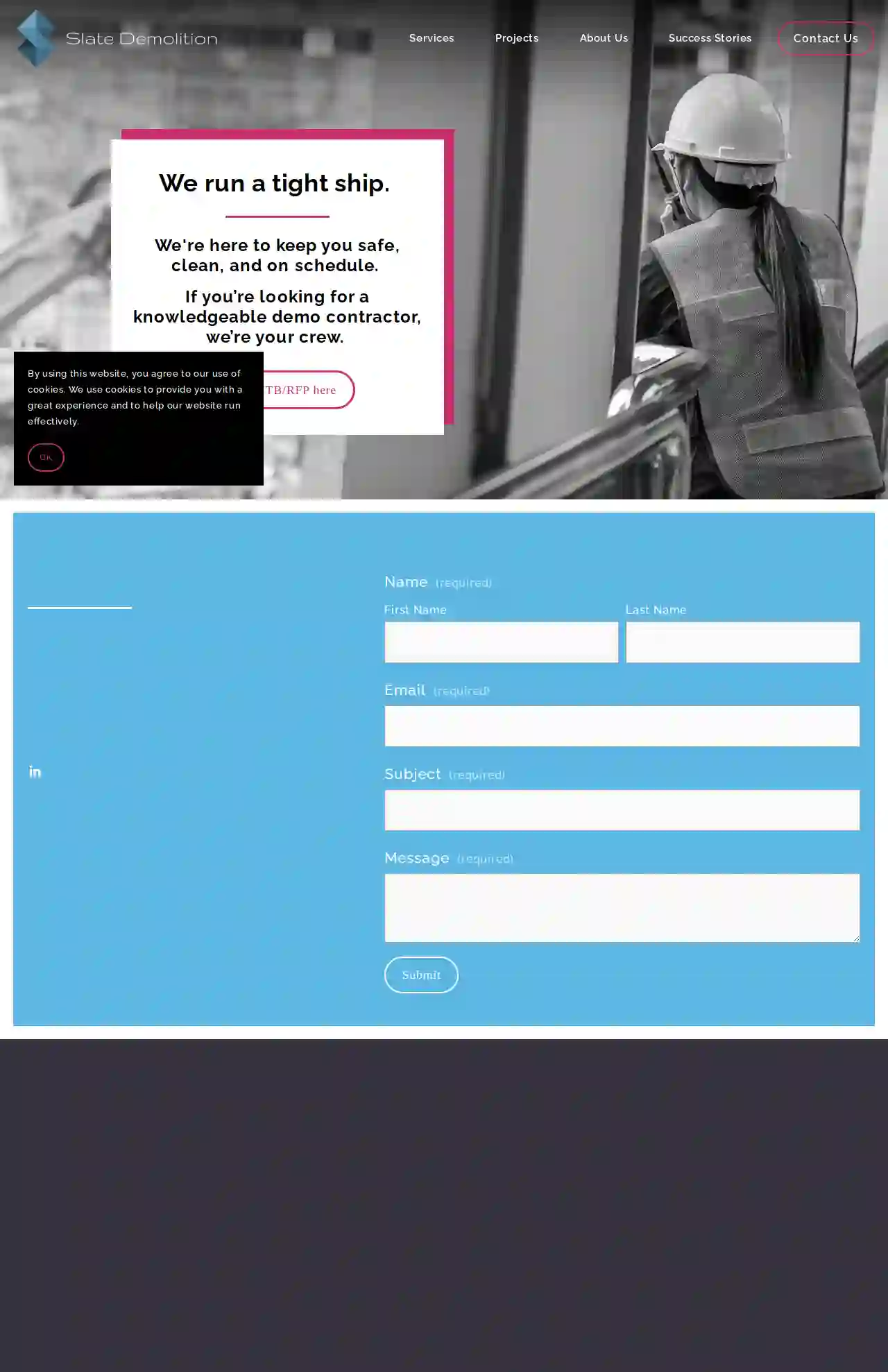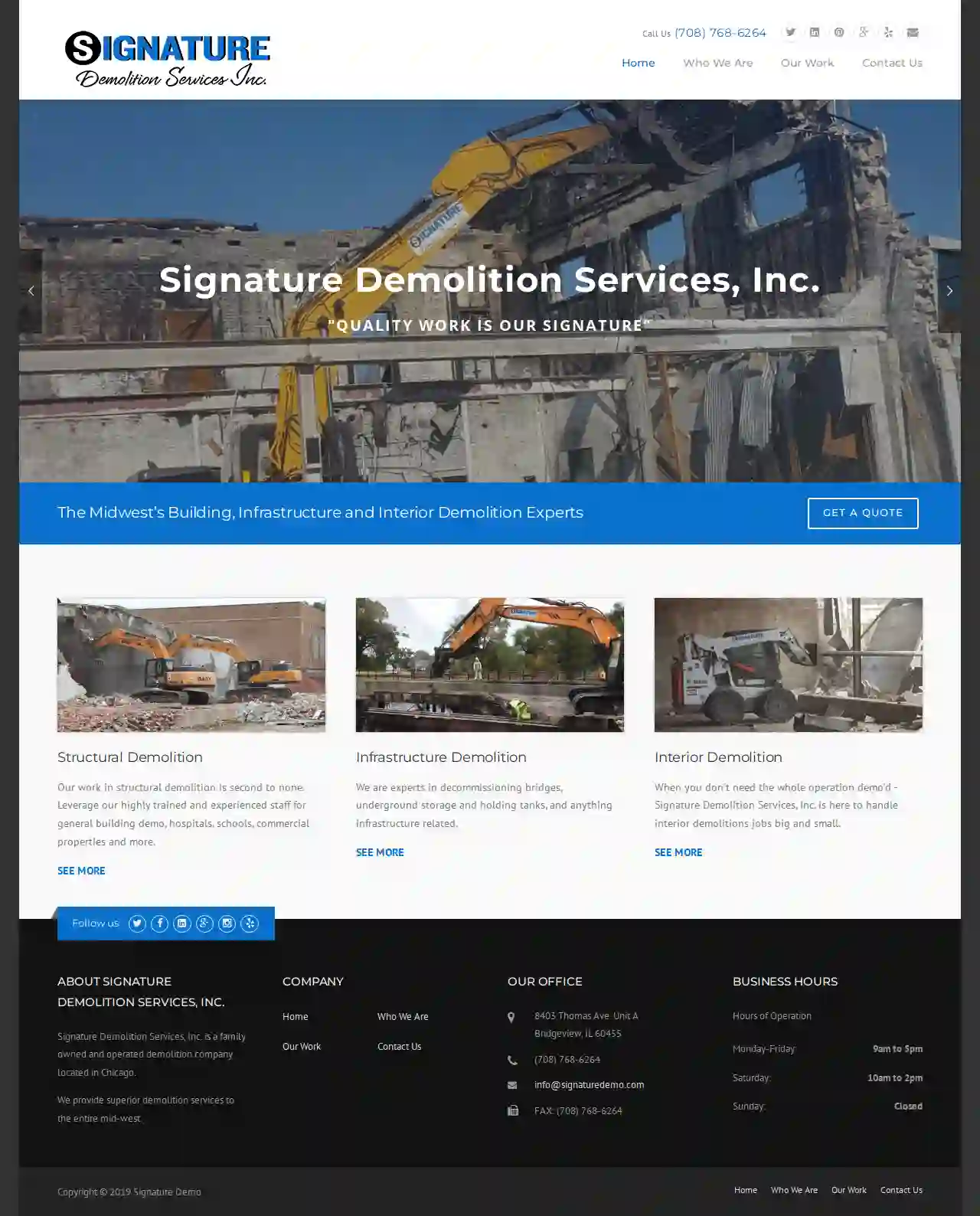Demolition Contractors Rockford
Top 10 Local Demolition Contractors in Rockford
Get multiple Building Demolition quotes for your project today! Compare profiles, reviews, accreditations, portfolio, etc... and choose the best deal.

Brandenburg
52 reviewsSuite 204, 501 W. Lake St., Elmhurst, 60126, USBrandenburg, established in 1968, is one of the nation’s premier firms specializing in demolition and environmental remediation, which includes asbestos abatement, hazardous material removal, soil remediation, asset recovery, and site preparation. Brandenburg has five regional offices located throughout the United States, a staff in excess of 800 full-time permanent employees, and a fleet of heavy equipment valued in excess of $150,000,000. We have the knowledge, expertise, and resources necessary to get any job done safely and efficiently. Brandenburg is committed to providing a safe work environment for our employees and our customers. We are the first demolition contractor to successfully complete OSHA’s Challenge Program and to be certified as a Star Member in OSHA’s prestigious Voluntary Protection Program (VPP). Star Member designation is the highest level of recognition. Brandenburg also participates in various state safety programs such as MNSTAR (Minnesota Occupational Safety and Health Administration). MISSION STATEMENT Implement safe, environmentally responsible, cost effective methods which deliver the best attainable combination of demolition, environmental remediation, and asbestos abatement services consistently. VISION STATEMENT Continuously improve demolition, environmental remediation, and asbestos abatement methods to assure that the best attainable solutions are delivered to our customers, our employees, the public, and the environment. ABOUT BRANDENBURG Brandenburg is committed to providing a safe work environment for our employees and our customers. We are the first demolition contractor to successfully complete OSHA’s Challenge Program and to be certified as a Star Member in OSHA’s prestigious Voluntary Protection Program (VPP). Star Member designation is the highest level of recognition. Brandenburg also participates in various state safety programs such as MNSTAR (Minnesota Occupational Safety and Health Administration). SAFETY FIRST Brandenburg is committed to providing a safe work environment for our employees and our customers. We are the first demolition contractor to successfully complete OSHA’s Challenge Program and to be certified as a Star Member in OSHA’s prestigious Voluntary Protection Program (VPP). Star Member designation is the highest level of recognition. Brandenburg also participates in various state safety programs.
- Services
- Why Us?
- Accreditations
- Gallery
Get Quote
Murray Demolition
56 reviews3940 W Ferdinand St, unit B, Chicago, 60624, USMurray Demolition is a demolition contractor in Chicago, Illinois, that adopts only the best practices in the industry. With a team of skilled professionals and state-of-the-art equipment, we efficiently and effectively carry out demolition projects without causing great inconvenience to our clients and their neighbors. Our team is dedicated to providing top-notch demolition services, including residential, commercial, industrial, and internal demolition. We also offer additional services such as building site preparation, asbestos removal, and concrete demolition. At Murray Demolition, we understand the importance of precision and experience in the demolition and construction industry. That's why we're committed to delivering exceptional results that meet our clients' needs and exceed their expectations.
- Services
- Why Us?
- Accreditations
- Gallery
Get Quote
Landmark Demolition
558 reviews18w155 63rd st, Westmont, 60559, USLANDMARK DEMOLITION is a demolition company serving Chicago and surrounding areas. We specialize in a variety of demolition projects, from small residential jobs like driveways and decks to large commercial projects like factories and office buildings. Our team has over 20 years of experience in the construction industry and is dedicated to providing safe, efficient, and quality demolition services. We understand that demolition can be a stressful process, so we strive to make it as easy as possible for our clients. We are committed to providing top-notch support and a quick turnaround time. No project is too big or small for our company. We are determined to face the difficult projects head-on that other companies refuse to touch. We'll get it done with a smile. Our team has experience in many different areas of the construction industry, but demolition is our passion. We guarantee satisfaction and safety with our quick and cost-efficient services. We treat our clients the way we treat our friends, with a positive attitude every day. You’ll never have to worry about whether we’ll get the job done properly, so the only thing left to give you a headache will be the dust. Contact us today for a free estimate.
- Services
- Why Us?
- Gallery
Get Quote
G3 Contractors
3.911 reviews1203 Pryor Street, Silver Lake, 53170, USAbout G3 Contractors G3 Contractors is a locally owned and operated residential and commercial demolition, excavation, and clean-out company. We specialize in demolition services such as pool, deck, fence, home, mobile home, business, and interior demolition. We also offer excavation and grading services for our residential and commercial customers. G3 Contractors can also handle residential and commercial building clean out as well as flat work.
- Services
- Why Us?
- Testimonials
- Gallery
Get Quote
Viva Demolition and Remodeling
1123 Main St, CityName, 12345, USViva Demolition and Remodeling is a professional, fully insured, and licensed company specializing in demolition, remodeling, and construction services. With over 15 years of experience, our team of experts is dedicated to providing top-notch services tailored to meet our clients' unique needs. Our mission is to deliver exceptional results, ensuring customer satisfaction and building long-lasting relationships.
- Services
- Why Us?
- Accreditations
- Our Team
- Testimonials
Get Quote
EHC Industries Inc
4.54 reviews366 Hollow Hill Dr., Wauconda, 60084, USYour Chicagoland Remediation Company Confident - Committed - Qualified We are the partner for your project that you are looking for As a leader in our industry, we have earned a reputation of trust and confidence. Our references will demonstrate that we are committed to meeting our customer’s needs and in that a relationship is started. Continued excellent performance builds those relationships into long term partnerships.
- Services
- Why Us?
- Gallery
Get Quote
Modern Builders and Design
574 reviews283 W Whispering Oaks Lane, Round Lake, 60073, USModern Builders & Design is a family-owned and operated construction company proudly serving Round Lake, IL, and the surrounding areas since 2007. With over a decade of experience, we bring the skills and expertise needed to handle any construction project, big or small. We are fully licensed and insured, and we prioritize clear communication and transparency throughout every project. Our team of professionals is dedicated to providing high-quality services using the best tools and materials available. We believe in building lasting relationships with our clients based on trust, honesty, and integrity. We strive to exceed expectations by delivering exceptional results and ensuring complete customer satisfaction. Whether you need residential or commercial construction services, Modern Builders & Design is your trusted partner for all your building needs.
- Services
- Why Us?
- Gallery
Get Quote
The Mule Junk Removal Champaign County
4.9229 reviewsUrbana, IL, 2706 N Cunningham Ave, 61802, USThe Mule is a licensed, insured, locally-owned family business specializing in residential and commercial junk removal, hauling, and light demolition services. They offer free estimates, transparent pricing, and prioritize customer satisfaction. The Mule serves Champaign County and beyond, providing services such as emergency jobs, same or next-day service, light demolition, trailer/dumpster rentals, recycling/e-waste, large piece removals, and senior/veteran discounts. They also provide landscaping bulk deliveries and removal of garden waste, fallen trees, and other outdoor items.
- Services
- Why Us?
- Accreditations
- Our Team
- Testimonials
- Gallery
Get Quote
Slate Demo
15900 N Landers Ave., Chicago, 60646, USSlate Demolition LLC is a woman-owned, union demolition contractor specializing in commercial interior demolition and dismantling. Slate Demolition is certified WBE with the City of Chicago. Slate Demolition’s staff has decades of demolition and new construction experience. Our new construction experience allows us to approach a project with a cost savings/cost avoidance mindset. Where possible, our staff will recommend adjustments to the demolition scope of work, ultimately resulting in a cost savings to the overall project budget. We run a tight ship. We're here to keep you safe, clean, and on schedule. If you’re looking for a knowledgeable demo contractor, we’re your crew.
- Services
- Why Us?
- Accreditations
- Our Team
- Testimonials
- Gallery
Get Quote
Signature Demolition Services Inc
51 reviews8403 Thomas Ave. Unit A, Bridgeview, 60455, USSignature Demolition Services, Inc. is a family owned and operated demolition company located in Chicago. We provide superior demolition services to the entire mid-west. Signature Demolition Services, Inc. specializes in structural demolition, infrastructure demolition, and interior demolitions. No project is too large for our highly trained and experienced crews. When Time Matters Signature Demolition Services, Inc. works to meet your deadlines and brings the necessary equipment to get the job done right. The Midwest’s Building, Infrastructure and Interior Demolition Experts Structural Demolition Our work in structural demolition is second to none. Leverage our highly trained and experienced staff for general building demo, hospitals, schools, commercial properties and more. Infrastructure Demolition We are experts in decommissioning bridges, underground storage and holding tanks, and anything infrastructure related. Interior Demolition When you don't need the whole operation demo'd - Signature Demolition Services, Inc. is here to handle interior demolitions jobs big and small.
- Services
- Why Us?
- Gallery
Get Quote
Over 8,858+ Demolition Businesses registered
Our demolition providers operate in Rockford and surrounding areas!
DemolitionMatch has curated and vetted Top Demolition Contractors in Rockford. Find the most reliable business today.
Frequently Asked Questions About Demolition Contractors
- Obtaining Permits: Securing all necessary permits and approvals before commencing demolition.
- Compliance with Codes and Regulations: Adhering to building codes, environmental regulations, and safety standards during all demolition activities.
- Worker Safety: Providing a safe working environment for their employees and complying with occupational safety regulations.
- Waste Management: Properly handling, transporting, and disposing of demolition debris in accordance with environmental laws.
- Public Safety: Taking measures to protect the public from any hazards associated with the demolition.
- Insurance and Bonding: Maintaining adequate insurance coverage and surety bonds to protect against potential liabilities.
- Experience: 'How long have you been in business, and what experience do you have with similar demolition projects?'
- Licensing and Insurance: 'Can you provide proof of your licenses and insurance coverage?'
- Safety Record: 'What are your safety protocols and training procedures for your workers?'
- Demolition Method: 'What demolition method do you recommend for my project, and why?'
- Project Timeline: 'What is the estimated timeframe for completing the demolition, including debris removal?'
- Cost Breakdown: 'Can you provide a detailed breakdown of the costs involved in the demolition?'
- Permits and Approvals: 'Will you be handling the acquisition of necessary permits and approvals?'
- Waste Management: 'How will you handle the removal and disposal of demolition debris? Do you offer recycling options?'
- References: 'Can you provide references from past clients who have had similar demolition projects?'
- Waste Management: Proper handling, sorting, and disposal of demolition debris to minimize landfill waste.
- Recycling: Maximizing the recycling of materials like concrete, steel, wood, and other salvageable components.
- Hazardous Materials: Safe removal and disposal of hazardous materials in accordance with environmental regulations.
- Dust and Noise Control: Implementing measures to minimize dust and noise pollution during demolition.
- Erosion Control: Preventing soil erosion and sedimentation runoff.
- Site Security:
- Personal Protective Equipment (PPE):
- Dust Control:
- Noise Control:
- Hazard Identification and Mitigation:
- Emergency Response Planning:
- Regular Safety Training for Workers:
What are the legal responsibilities of a demolition contractor?
What questions should I ask a demolition contractor?
What are the environmental considerations during demolition?
What are the safety precautions taken during demolition?
What are the legal responsibilities of a demolition contractor?
- Obtaining Permits: Securing all necessary permits and approvals before commencing demolition.
- Compliance with Codes and Regulations: Adhering to building codes, environmental regulations, and safety standards during all demolition activities.
- Worker Safety: Providing a safe working environment for their employees and complying with occupational safety regulations.
- Waste Management: Properly handling, transporting, and disposing of demolition debris in accordance with environmental laws.
- Public Safety: Taking measures to protect the public from any hazards associated with the demolition.
- Insurance and Bonding: Maintaining adequate insurance coverage and surety bonds to protect against potential liabilities.
What questions should I ask a demolition contractor?
- Experience: 'How long have you been in business, and what experience do you have with similar demolition projects?'
- Licensing and Insurance: 'Can you provide proof of your licenses and insurance coverage?'
- Safety Record: 'What are your safety protocols and training procedures for your workers?'
- Demolition Method: 'What demolition method do you recommend for my project, and why?'
- Project Timeline: 'What is the estimated timeframe for completing the demolition, including debris removal?'
- Cost Breakdown: 'Can you provide a detailed breakdown of the costs involved in the demolition?'
- Permits and Approvals: 'Will you be handling the acquisition of necessary permits and approvals?'
- Waste Management: 'How will you handle the removal and disposal of demolition debris? Do you offer recycling options?'
- References: 'Can you provide references from past clients who have had similar demolition projects?'
What are the environmental considerations during demolition?
- Waste Management: Proper handling, sorting, and disposal of demolition debris to minimize landfill waste.
- Recycling: Maximizing the recycling of materials like concrete, steel, wood, and other salvageable components.
- Hazardous Materials: Safe removal and disposal of hazardous materials in accordance with environmental regulations.
- Dust and Noise Control: Implementing measures to minimize dust and noise pollution during demolition.
- Erosion Control: Preventing soil erosion and sedimentation runoff.
What are the safety precautions taken during demolition?
- Site Security:
- Personal Protective Equipment (PPE):
- Dust Control:
- Noise Control:
- Hazard Identification and Mitigation:
- Emergency Response Planning:
- Regular Safety Training for Workers: